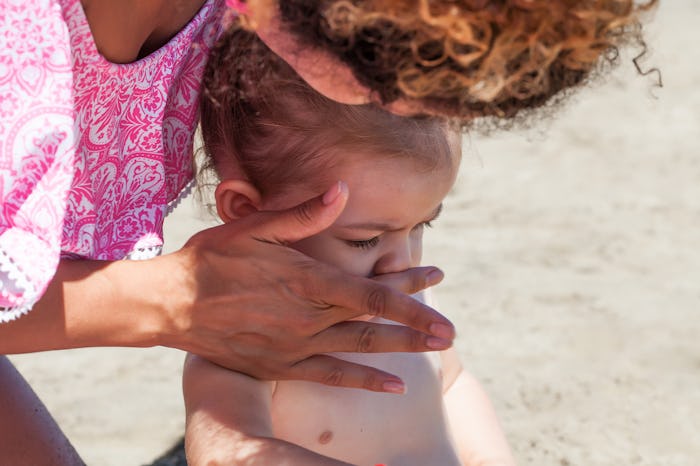Life
Here's When It's Safe To Put Sunscreen On Your Baby (Hint: It's Not Right Away)
The last thing you want is a baby with a sunburn this summer. You want their perfect, flawless skin to stay that way forever. But you also want to go outside, because the weather is beautiful and you've been cooped up inside all winter. If you're taking your little one outside this summer, sunscreen is probably at the top of your list. But if you have a young baby, you'll want to know, if sunscreen is safe for your baby, and if so, which ones.
Sunscreen is not safe for babies under the age of six months. That means you're going to have to be on the lookout for the tiniest rash guard and sun hat you've ever seen to protect them from the sun in those months. Dr. Lawrence Gibson explained on the Mayo Clinic website, "If your baby is younger than 6 months, keep him or her out of direct sunlight. Protect your baby from sun exposure by dressing him or her in protective clothing, a hat with a brim, and sunglasses." However, he warned that you'll want to make sure your baby doesn't get overheated wearing a hat and protective clothing if the temperature is high.
The reason you don't want to put sunscreen on a baby that's younger than 6 months old is that there's a higher risk for the chemicals in the sunscreen to cause a reaction or generally affect your baby. Dr. Hari Cheryl Sachs, a pediatrician with the Federal Drug Administration (FDA), explained on the FDA website that "babies' skin is less mature compared to adults, and infants have a higher surface-area to body-weight ratio compared to older children and adults," meaning an infant's "exposure to to the chemicals in sunscreen may be much greater."
However, the American Academy of Pediatrics (AAP) does say that "when adequate clothing and shade are not available, parents can apply a minimal amount of sunscreen with at least 15 SPF" to their face and hands. But the AAP warned that parents should keep in mind that sunscreen doesn't take effect for thirty minutes after application, so make sure to keep that in mind if your baby needs to be in direct sun.
Once your baby is older than 6 months, you can and should apply sunscreen liberally every two hours, or more often if they are in water or very sweaty, said Dr. Gibson. Just watch out that your sunscreen isn't mixed with an insect repellent with the chemical DEET, because reapplying insect repellent as often as sunscreen isn't necessary or desired.
When you're choosing a sunscreen, KidsHealth suggested making sure it meets the following requirements: it has an SPF of 30 or higher, protects against both UVA and UVB rays (otherwise called a broad spectrum sunscreen), and is water-resistant. The site explained, "Water reflects and intensifies the sun's rays, so kids need protection that lasts." In addition, the AAP warned that the sun's rays bounce back from sand, snow, and concrete in addition to water, so you'll want to be particularly cautious about visiting those areas when the sun is at its strongest, between 10 a.m. and 4 p.m.
KidsHealth also points out that all children (and adults) need sunscreen, regardless of their skin tone or whether they tend to burn or tan in the sun. "Although dark skin has more protective melanin and tans more easily than it burns, tanning is a sign of sun damage," reported the site. You'll want to use a shot-glass sized amount of sunscreen to cover all of the exposed areas of your kid's body effectively. Apply every two hours or as soon as they come out of the water, to keep their skin protected, and according to the Skin Cancer Foundation, opt for mineral-based options for maximum sun protection. These sit on top of the skin as opposed to absorb into, which is especially ideal for your baby's skin.
